It’s always a gift to discover a film with new perspectives, a filmmaker who thinks outside the box challenging not only his actors but the audience as well, inviting all to come along for the ride on an introspective philosophical journey that is reflective and thought-provoking, staying with you long after the curtain falls. That is exactly what writer/director Ido Fluk gives us with THE TICKET, a visually and aurally affecting character study of human nature as told through the eyes of one man.
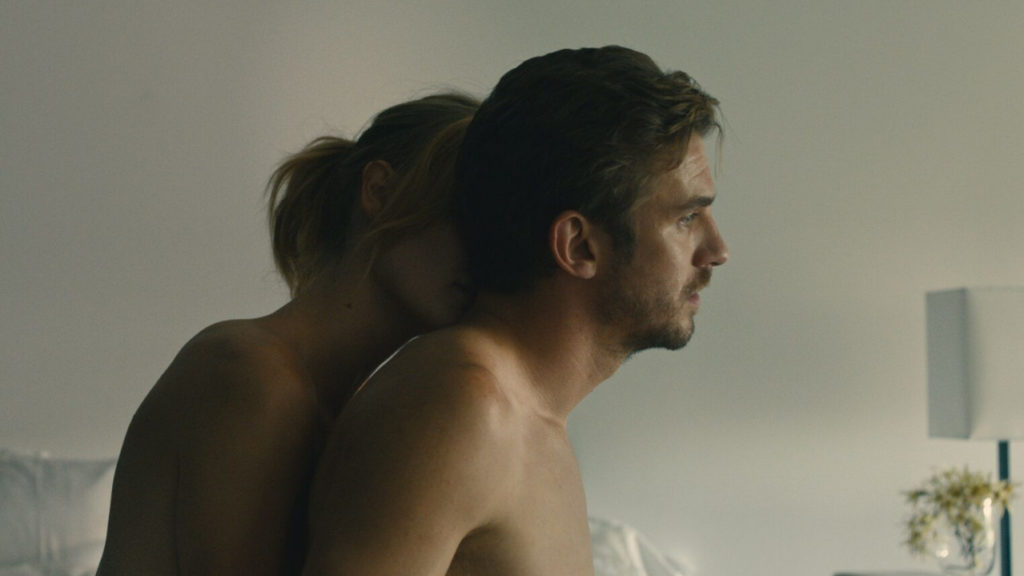
James is blind. Comfortable and confident in his life, while he may be visually impaired, his heart is not. He has a loving and supportive wife and son, a best friend and co-worker in Bob, who is also blind. He has a steady job at a real estate telemarketing company which is staffed only by the visually impaired. He has a somewhat active social life at the local dance hall which is frequented by both the sighted and visually impaired. Love and laughter fill his world. But then the unimaginable happens. A miracle. James suddenly regains his vision. He can see his son. He can see his wife. He can see his home, the dance hall and, he can see himself. But it doesn’t take long for James to become dissatisfied with what he sees.
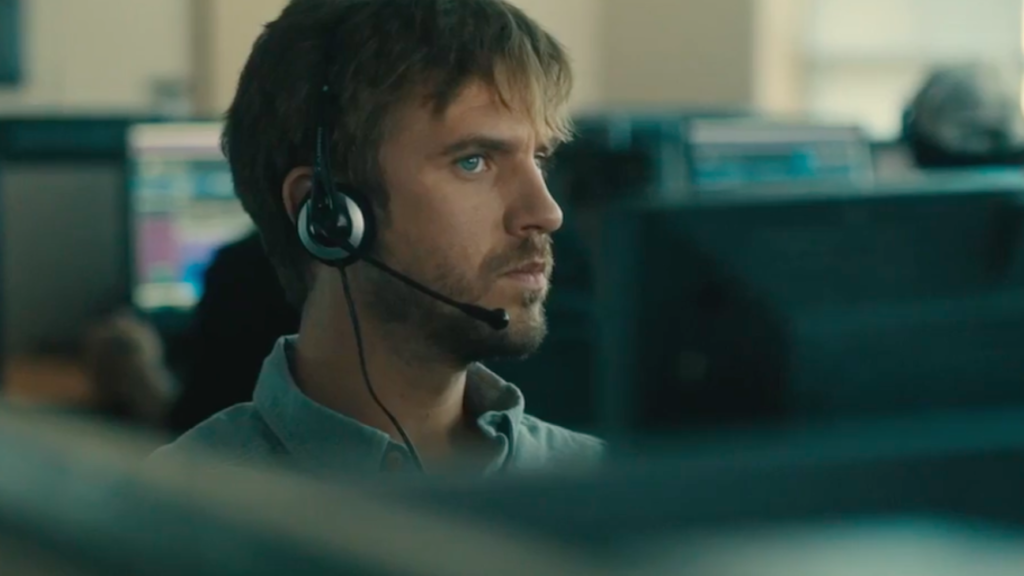
Considering himself a “new man” thanks to being sighted, James starts to succumb to the trappings of society and “keeping up with the Joneses”. He wants “things”. He wants the nicer home, a nice car, a prettier and less plain wife. He wants the tailored suits, manicures and well-groomed hair of a seven-figure executive. He wants the executive position and the corner office. And he sets out to get them, but at what cost?
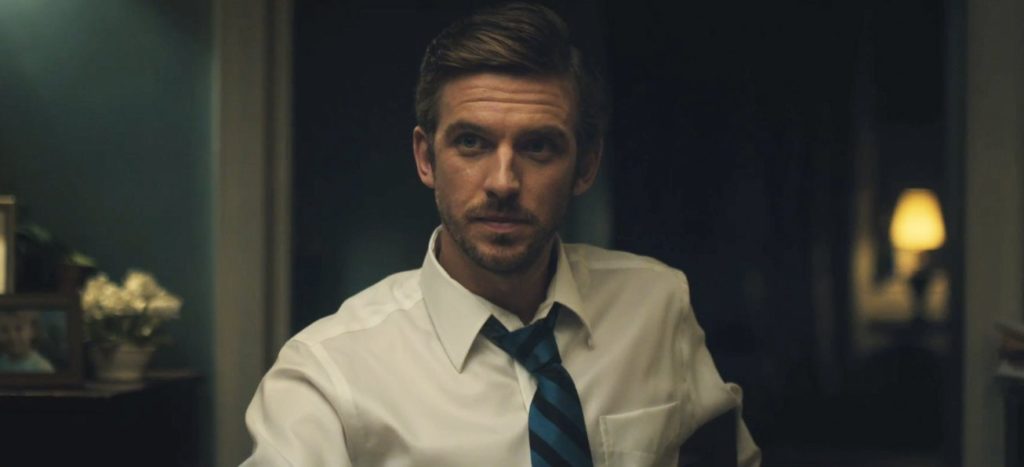
Looking to mythology and countless literary interpretations over the centuries dealing with one flying too high and then being knocked back to reality because of their own hubris, much like Icarus when warned by his father Daedalus to fly neither too high nor too low with his wax wings as the sea would clog the wings and the sun melt them, James ignores the pleas of his wife and his friend and charges full speed ahead with over-ambition and obsessiveness. James is a train that can’t be stopped even when destroying his marriage and alienating his friend. He falls into a darkness greater than any he had ever known, yet he doesn’t see what he has done. Can he ever return to the values and morals of the man he once was?
Talk about a thought-provoking character study; not just a study of one man, but of human nature! Co-written by director Ido Fluk and Sharon Mashihi, the structure of THE TICKET takes us not only on an emotional journey, but a fascinating philosophical one as well, questioning our values, making us look inside ourselves and define our own beliefs. Here James is given the ultimate golden ticket – the gift of sight – and yet he squanders it by straying from what were his perceived rock solid values. It’s a situation probably 99% of all humans have faced; making decisions similar to those of James and rejecting the ideals of humility and thankfulness. Fluk and Mashihi push the envelope as far as it can be pushed in crafting James’ story, culminating in a final question – Can the universe forgive the once devout and prayerful James and give him the “happily ever after” he seeks or is he doomed to live in the darkness forever?
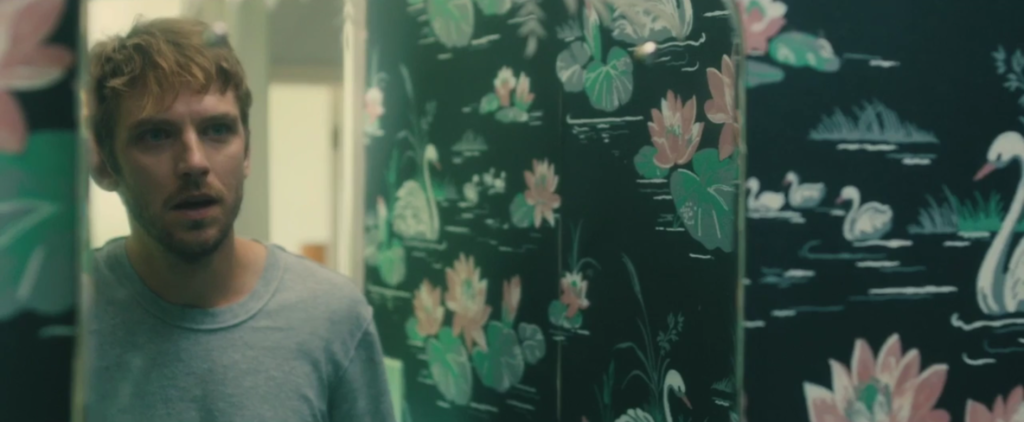
There is an emotional complexity to each of the characters. Each is sharply drawn with as much attention to emotion and physical detail as is given to Dan Stevens’ James. From the start, Fluk establishes an intimacy and closeness among the characters and their relationships, both visually and aurally. We hear the pillow talk of Sam and James, feeling their connection and their love. We hear James’ daily devotionals to God, thanking him for a wonderful life. But as strong and as close as the characters are defined, so are the crumbling bonds of marriage and friendship. By establishing those bonds so quickly and solidly, Fluk and Mashihi then erode them in believable and palpable fashion. Sam is frustrated as she is no longer “in charge”. Now sighted, James wants to be “man of the house” and assert his new independence both at home and at work. We feel the marriage crumble. We feel James’ relationships at work change as he climbs the corporate ladder. The meticulous nature with which the characters and the interpersonal relationships are crafted paint a compelling psychological portrait.
Director Ido Fluk maintains a quietness with the film, focusing on the visuals – and selecting key sequences to infuse eye-popping saturated colors of nature and life (notably wife and child) which are contrasted with an apartment of white on white, colorless – or a rather bland and sterile office. But what Fluk also does is force each of us to appreciate the gift of sound, something upon which James had to rely for most of his life. We are forced to listen and pay attention. Supervising sound editor Tom Ryan has designed what can only be described as a “sonic language” that heightens the audience’s own experience in watching and listening to THE TICKET. Wonderful subliminal design.
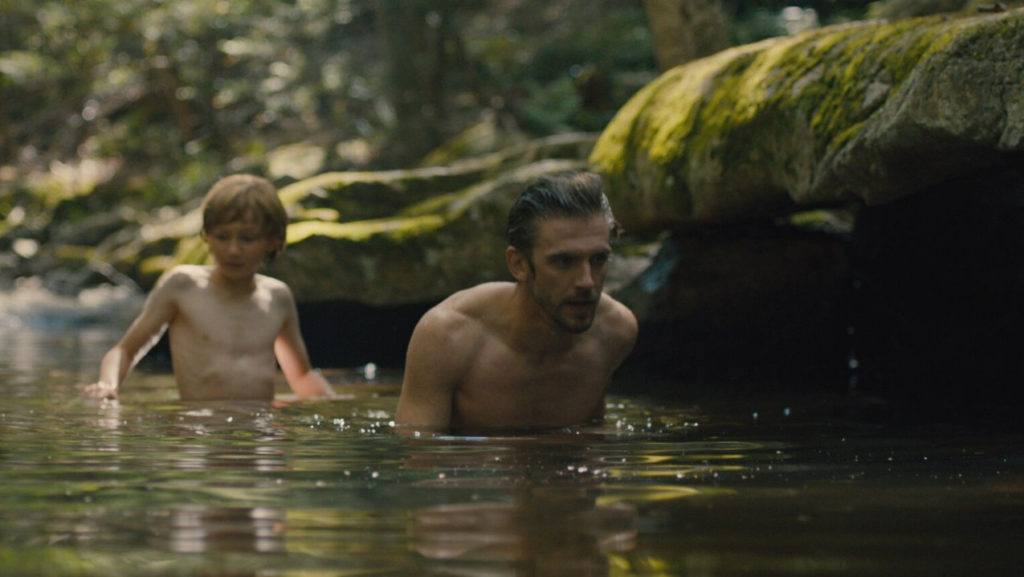
Previously unfamiliar with cinematographer Zack Galler, he is certainly now on the radar thanks to THE TICKET. Shooting with the Alexa and using Panavision Primo lenses, Galler and Fluk create a visual language revolving around specific camera acts within the film with each representing a different stage of James’ emotional state. As the film opens in darkness and we are initially met with only sound, as James slowly gains vision camera is handheld and the imagery slightly over-exposed as he adjusts to light and focus. Imagery is soft, with just enough punch and sharpness to create the striking difference that having sight for the first time would make. As James grows more confident (and cocky), the camera becomes heavier and is placed on sticks or tracking on a dolly while the color palette becomes a bit cooler moving to an almost white on white empty uniformity. By the third act twists, the camera becomes “slightly askew” as if trying to jolt some sense into James and the audience as to what he has done to himself and those around him. A wonderful visual storytelling structure. Stunning is the in-camera work of flickering and fading serving as a focal reference point both visually and emotionally. Notable is Fluk’s metaphoric use of windows, corridors, natural light and slatted window blinds with each speaking volumes in their own way.
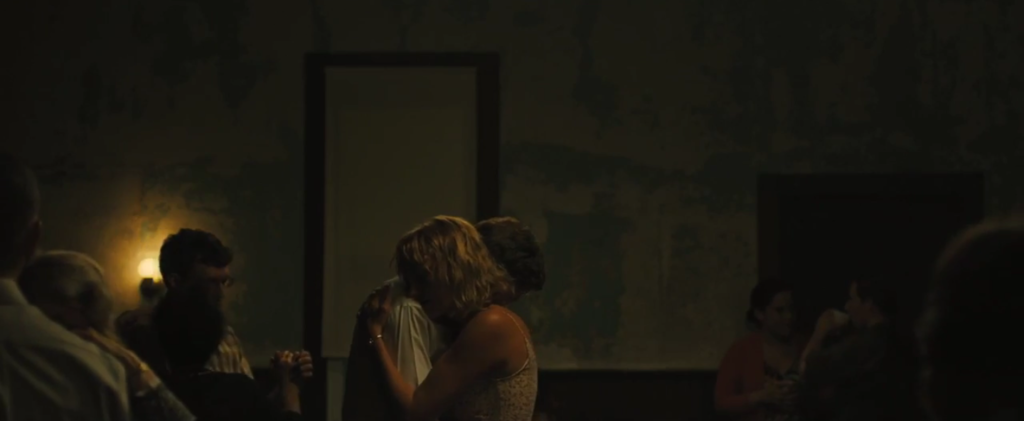
A significant story element of THE TICKET is the dance hall, a place where the characters each let their guard down and where truths are revealed. Standout is the heartbreaking “final dance” between James and Sam as he reluctantly agrees to take her out for a spin one last time. Galler’s camera moves in with extreme close-ups, capturing the last flickers of love as they turn to cold embers through movement and touch.
Hand-in-hand with Galler’s lensing is the work of production designer Gina Fortebuono who creates worlds as distinctive as those of sound editor Ryan. Thanks to Fortebuono, there is a degree of sympathy for James as he sees for the first time the world in which he has lived. The images James created in the darkness of his mind are nothing like reality. Sam is plainer and somewhat dowdy. Their home has vintage floral wallpaper covering the walls. Furniture is less than stylish. The office is stark, as if intentionally designed for the blind with no attention paid to any decor or visual appeal. Bob’s house is dark and empty. And then James’ apartment with large windows, streaming light, white on white, and multi-leveled interior is as far a departure from his home with Sam as one could imagine.
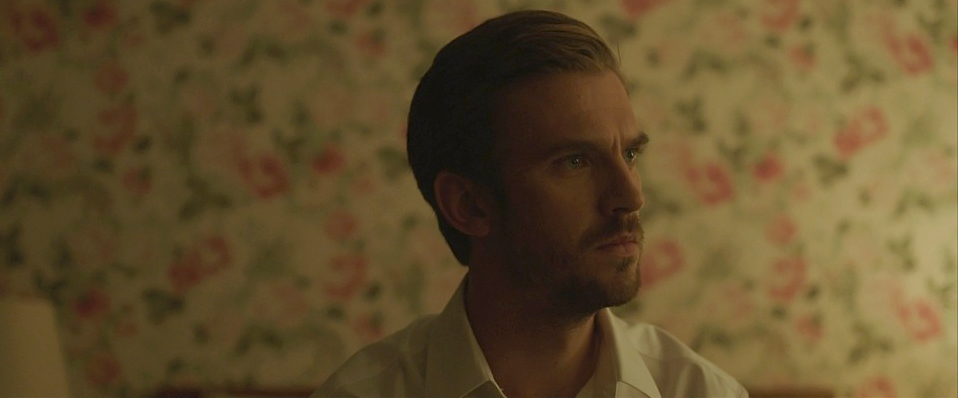
A mix of sighted and visually impaired individuals, Fluk and his team did research into blindness, speaking with the visually paired, attending events with them to not only speak with them but observe movement and habit. This allowed for authenticity at the dance hall with body movement, at the office with rote procedure. Key are the conversations they had with medical specialists so as to include medical fact as a reason for James’ sudden sight. The answer? A shrinkage of a pituitary tumor.
Forget about Dan Stevens in “Beauty and the Beast”. This is the performance from Stevens that you want to see. Outstanding. Stevens runs the gamut of emotions and reflects them facially, tonally and physically. We see him become confident in manner, dress, stride, even speech. On the flip side, we also see him regress and lose that confidence by the third act. His posture changes, his stride changes, his attention to neatness (shirt tucked in, hair combed) goes out the window with all creating a vulnerability and inconsolable sense of being lost. There is helplessness which Stevens imbues within James that is not only shocking, but bittersweet and poignant. Stevens is positively riveting.
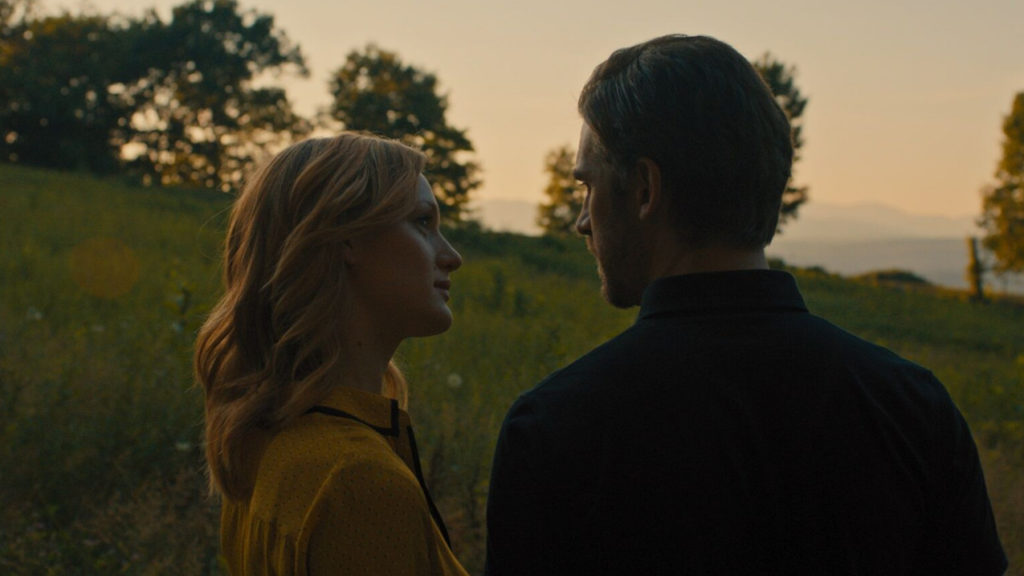
Oliver Platt is a quiet, strong presence as Bob. A very restrained but effective performance, Platt draws one into the dynamic of Bob and James and how their friendship changes with James’ sight while Bob remains visually impaired. Malin Akerman is likewise, quiet, strong and unwavering in her presence. It’s an interesting performance from Akerman who is typically bouncier in her chosen roles. Kerry Bishe is cliche, but a necessary cliche for Jessica’s role in Bob’s life and the story progression.
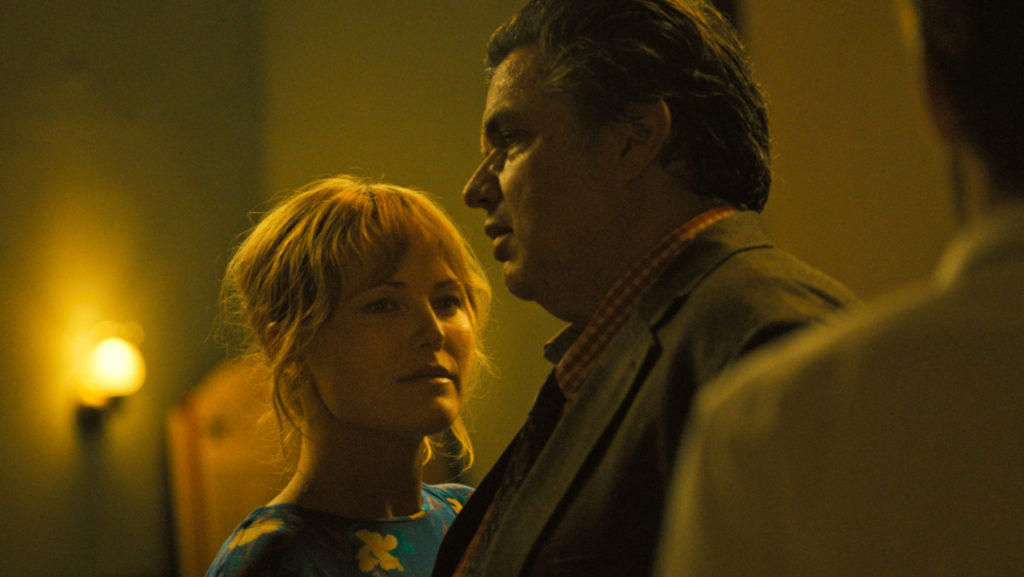
Tying everything together is an interesting and tonally effective score by Danny Bensi and Saunder Jurriaans.
A true marriage of sight and sound, elevated by a compelling story and riveting performances, the audience’s own senses will be heightened by THE TICKET as we question ourselves and the idea of who indeed is the blind man here.
Directed by Ido Fluk
Written by Ido Fluk and Sharon Mashihi
Cast: Dan Stevens, Malin Ackerman, Oliver Platt, Kelly Bishe












